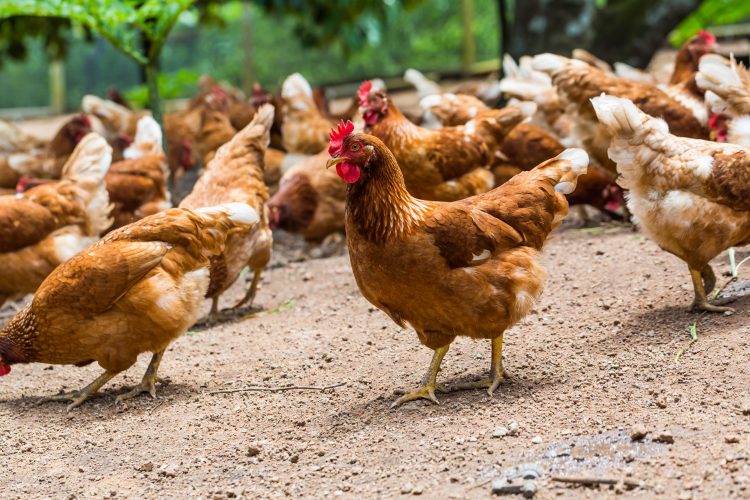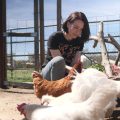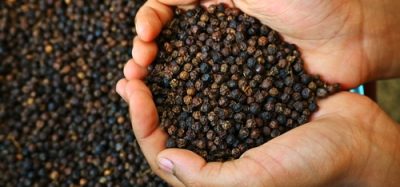“Cage-Free” is so much more than a label
- Like
- Digg
- Del
- Tumblr
- VKontakte
- Buffer
- Love This
- Odnoklassniki
- Meneame
- Blogger
- Amazon
- Yahoo Mail
- Gmail
- AOL
- Newsvine
- HackerNews
- Evernote
- MySpace
- Mail.ru
- Viadeo
- Line
- Comments
- Yummly
- SMS
- Viber
- Telegram
- Subscribe
- Skype
- Facebook Messenger
- Kakao
- LiveJournal
- Yammer
- Edgar
- Fintel
- Mix
- Instapaper
- Copy Link
Posted: 23 March 2023 | Vicky Bond | No comments yet
Vicky Bond discusses why she thinks the “quest for cheap meat and eggs has gone much too far” and why it is important to hold companies accountable to their cage-free promises.


This October, the US’ highest court spent more than two hours in a heated debate about a law addressing extreme animal confinement.
National Pork Producers Council v. Ross, the case in which the pork industry challenged California’s Proposition 12 before the Supreme Court, felt like the ceremonious expression of an internal reckoning we’re all just beginning to face. In our hearts, we all know it to be true: our quest for cheap meat and eggs has gone much too far.
A clear majority of consumers care about animal welfare, and there’s no better proof than the flourishing demand for cage-free eggs. The US egg-laying flock was 33.9 percent cage-free in December of 2021, up from a mere five percent in 2015. With hundreds of companies making cage-free commitments, this percentage is on track to increase. It’s largely thanks to changing consumer habits—and respective pressure from restaurant chains and businesses—that cage-free eggs are fast becoming the norm, not the exception.
But while animal welfare commitments are critical, it’s just as important that we hold companies accountable to their promises. Although much of the work has been done to push the US food sector to commit to cage-free sourcing, work remains to ensure those companies publicly report on their progress and fulfill their commitments. Actions indeed speak louder than words—especially for the animals who will never hear them.
What does “cage-free” really mean?
In what might come as a surprise to many, eggs are one of the worst animal products from a welfare perspective—right up there with oft-condemned veal, lamb, and foie gras. It’s important to understand that “cage-free” is about way more than just being in a cage. It’s about not being in a battery cage, an archaic form of extreme confinement that’s been used for decades by the vast majority of the egg industry. And that makes a tremendous difference.
Packed into spaces the size of filing cabinets, hens confined to battery cages can’t even extend their wings. Unnoticed by overworked employees, hens jostle each other seeking momentary relief from broken bones, excruciating deformities, and infections. Selectively bred for “productivity,” many overtaxed hens suffer from cage layer fatigue, a condition in which calcium leaches out of a hen’s bones from the constant demands of producing eggshells. As her skeletal system weakens, she can become paralysed and die a slow death from thirst or starvation. Cage layer fatigue is found almost exclusively in hens confined to battery cages due to their inability to walk around.
Dunkin’ Donuts and Arby’s commits to sourcing only cage-free eggs
One of the most heartbreaking things undercover investigators describe is the egg-laying process. Driven by her instincts, a bedraggled hen desperately seeks privacy until she finally “mimes” building a nest, scratching at the barren wire floor before laying. When one hen succumbs to the physical and psychological stress, others pile on top of her, preferring to stand on her soft body than the sharp wire that catches and mangles their sensitive feet. Our nation’s cheap eggs come at a steep expense—the suffering of countless animals, the safety of industry workers, and our own moral dignity.
But the cage-free egg supply is already there, and, while not simple, the path forward is refreshingly direct. Many major companies are meeting or exceeding their timeline goals for making the transition. To date, over 400 US companies have committed to sourcing 100 percent cage-free eggs, with Costco, Trader Joe’s, General Mills, and many more openly reporting their progress on their websites. Our country agrees that we need a higher standard of animal welfare. But we won’t get it without vigilance.
Taking accountability
While many companies are leading the way on their cage-free commitments, some are falling behind. As a long-time animal advocate, I’ve shifted my focus over the years from pursuing corporate commitments to following up with them. Some companies are refusing to take meaningful action to address battery cages—secretly taking down their policies, failing to share progress with the public, or simply not doing enough. The Humane League’s 2023 Eggsposé, an investigative report published by the organization I work for, lists some of the companies that have remained silent about their cage-free promises.
Every cage-free commitment is a cause for celebration. And at the same time, our work is just beginning. “Cage-free” is more than a smart PR decision. In this critical phase of the cage-free transition, we have a chance to meaningfully reduce the suffering of millions by holding corporate giants to the task. Yes, hens are at the mercy of companies—but companies are at the mercy of our wallets, are they not?
About the author


Related topics
Quality analysis & quality control (QA/QC), Regulation & Legislation, Supply chain, Sustainability, Trade & Economy









